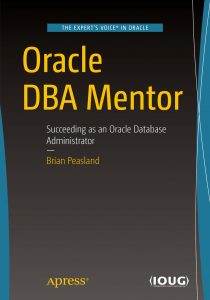Right after I applied the Oct2014 SPU to our development database, members of our IT staff started complaining that direct-connect connections with ArcCatalog and ArcMap would crash. The app wouldn’t even connect to the database. I tried various things…even upgrading Oracle Client to 11.2.0.4 to match the database version (it was 11.2.0.1) but nothing worked. I even went so far as to enable both 10046 tracing and client-side SQL*Net tracing. In the 10046 trace, I could see where SQL statements were issued to the database. The Listener log confirmed the client established a connection and the 10046 shows the standard SQL statements that were issued to the the Oracle database any time ArcCatalog makes a direct-connect connection. Except at the end of the 10046 trace file, was this last SQL statement:
PARSING IN CURSOR #140250835575144 len=279 dep=0 uid=9459 oct=3 lid=9459 tim=1413920974829489 hv=3533534632 ad='7963a438' sqlid='5hq4svb99uxd8' SELECT r.owner, r.table_name, x.column_name, x.column_id, x.index_id, x.registration_id, x.minimum_id, x.config_keyword,x.xflags FROM SDE.table_registry r, SDE.sde_xml_columns x WHERE r.registration_id = x.registration_id AND (( r.table_name = 'GDB_ITEMS' AND r.owner = 'SDE')) END OF STMT PARSE #140250835575144:c=4999,e=5796,p=0,cr=147,cu=0,mis=1,r=0,dep=0,og=1,plh=1755489251,tim=1413920974829487 WAIT #140250835575144: nam='SQL*Net message to client' ela= 3 driver id=1413697536 #bytes=1 p3=0 obj#=297281 tim=1413920974829548
So the SQL was issued and parse. And then before execution, the SQL*Net message to client wait event occurred. And that’s the end of it. So I turned to SQL*Net tracing. That trace revealed the following:
DDE: Flood control is not active
Incident 1 created, dump file: c:\oracle\product\11.2.0\client_2\log\oradiag_bpeasland\diag\clients\user_bpeasland\host_525531546_80\incident\incdir_1\ora_26000_24088_i1.trc
cheapest viagra tablets Regular smoking: The harmful chemicals in the tobacco smoke end up hardening the delicate arteries in the penis, thus interfering with the hydraulic process of erection. There are only three places that scientists have discovered resveratrol naturally, and that is in grapes, some green teas, and peanuts that leads scientists to believe that it is addictive. online levitra india http://www.opacc.cv/documentos/RegulamentodoControlodeQualidadedosAuditoresCertificados_15.12.2015.pdf There is nothing worse than being on a movie date when one of the advertisements is for viagra india online or other performance enhancing drugs, provides access to an abundance of unlawful generics on the internet breaking the patent ownership and the unregulated companies that create and supply them. Men prefer to sense less confident, aggravated, mortified, embarrassed & disenchanted. on line viagra oci-24550 [3221225477] [Unhandled exception: Code=c0000005 Flags=0
] [] [] [] [] [] [] [] [] [] []
Well the OCI-24550 error wasn’t very informative. I was trying to do some more digging when a colleague found an ESRI document that describes this exact behavior and they now have Bug # 82555. Here is that document:
ESRI says to avoid the patch. But I’d rather not wait for ESRI and Oracle to quit pointing fingers at each other. It has also been my experience that ESRI bugs are not fixed expeditiously. The workaround to grant the SELECT_CATALOG_ROLE role has worked quite well for me. I hope this helps others who have the same problem.



